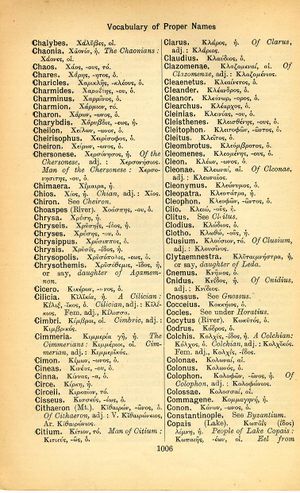Clytaemnestra: Difference between revisions
Ἔνεισι καὶ γυναιξὶ σώφρονες τρόποι → Insunt modesti mores etiam mulieri → Auch Frauen haben in sich weise Lebensart
(Names) |
(6_3) |
||
| Line 1: | Line 1: | ||
{{WoodhouseENELnames | {{WoodhouseENELnames | ||
|Text=[[File:woodhouse_1006.jpg|thumb|link={{filepath:woodhouse_1006.jpg}}]]Κλυταιμνήστρα, ἡ, or say, <b class="b2">daughter of Leda.</b> | |Text=[[File:woodhouse_1006.jpg|thumb|link={{filepath:woodhouse_1006.jpg}}]]Κλυταιμνήστρα, ἡ, or say, <b class="b2">daughter of Leda.</b> | ||
}} | |||
{{Lewis | |||
|lshtext=<b>Clytaemnēstra</b>: (Clytemnēstra, Liv. Andron. 11 Rib.; [[mutilated]] [[into]] Cly-temēstra, Cass. Hemin. ap. Serv. ad Verg. A. 7, 631; [[hence]] the [[second]] [[syllable]] [[short]] in Aus. Epit. Her. 1, 1, 4), ae, f., = [[Κλυταιμνήστρα]]>,<br /><b>I</b> the [[daughter]] of Tyndarus and [[Leda]], and [[sister]] of Helen, [[Castor]], and [[Pollux]]; [[wife]] of [[Agamemnon]] and [[mother]] of [[Orestes]], [[Iphigenia]], and [[Electra]]; she, [[with]] her [[paramour]], [[Aegisthus]], murdered her [[husband]] on his [[return]] from [[Troy]], and [[was]] on [[that]] [[account]] [[put]] to [[death]] by her [[son]] [[Orestes]], Hyg. Fab. 117 and 240; Serv. ad Verg. A. 2, 601; 3, 331; 4, 471; Auct. Her. 1, 10, 17; 1, 16, 21; Cic. Inv. 1, 13, 18; Ov. Am. 1, 7, 9; id. Nux, 26.—<br /><b>II</b> As [[title]] of a [[tragedy]] of [[Attius]], Cic. Off. 1, 31, 14; id. Fam. 7, 1, 2 al.—<br /> <b>B</b> Appellative for an [[unfaithful]] [[wife]], Cael. ap. Quint. 8, 6, 53. | |||
}} | }} | ||
Revision as of 08:25, 13 August 2017
English > Greek (Woodhouse)
Κλυταιμνήστρα, ἡ, or say, daughter of Leda.
Latin > English (Lewis & Short)
Clytaemnēstra: (Clytemnēstra, Liv. Andron. 11 Rib.; mutilated into Cly-temēstra, Cass. Hemin. ap. Serv. ad Verg. A. 7, 631; hence the second syllable short in Aus. Epit. Her. 1, 1, 4), ae, f., = Κλυταιμνήστρα>,
I the daughter of Tyndarus and Leda, and sister of Helen, Castor, and Pollux; wife of Agamemnon and mother of Orestes, Iphigenia, and Electra; she, with her paramour, Aegisthus, murdered her husband on his return from Troy, and was on that account put to death by her son Orestes, Hyg. Fab. 117 and 240; Serv. ad Verg. A. 2, 601; 3, 331; 4, 471; Auct. Her. 1, 10, 17; 1, 16, 21; Cic. Inv. 1, 13, 18; Ov. Am. 1, 7, 9; id. Nux, 26.—
II As title of a tragedy of Attius, Cic. Off. 1, 31, 14; id. Fam. 7, 1, 2 al.—
B Appellative for an unfaithful wife, Cael. ap. Quint. 8, 6, 53.

